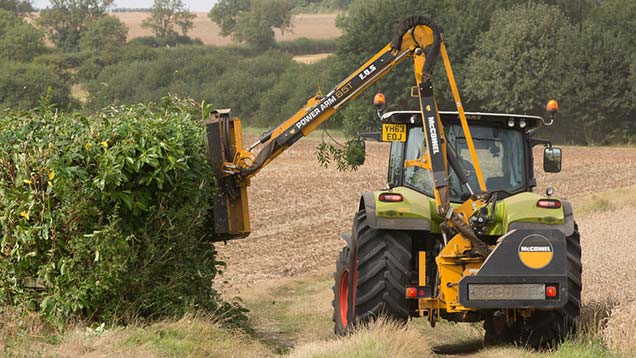Defra urged to review ‘farcical’ hedgecutting ban
 © Tim Scrivener
© Tim Scrivener Agricultural contractors are urging government to review the hedgecutting ban and allow hedges around arable land to be trimmed in August.
Defra extended the ban on hedgecutting into August, which started this summer in England, to protect nesting birds as part of EU legislation.
Farmers were able to apply to Defra for a derogation from the cross-compliance penalties to trim hedges in August, but only if they were drilling oilseed rape or temporary grass adjacent to a hedge.
See also: Farmers frustrated by hedge-trimming ban extension
However, the first year of the ban in England caused huge practical issues for many farmers and contractors, who have been prevented from trimming hedges during one of their busiest periods.
Hedging contractor Robert Rutt, who trims about 2,630ha of hedges in the Northamptonshire/Leicestershire/Rutland area, urged Defra to review the policy.
“The ban is a complete farce. I think Defra have got it terribly wrong,” said Mr Rutt.
“They should have said that from 1 August you can cut hedges on all arable land, including wheat and barley fields.
“From a practical point of view, it makes no sense to only allow a derogation for people to trim hedges who are drilling rapeseed.
“If the policy was changed to allow farmers to cut hedges around all arable land from 1 August and grassland from 1 September, we could follow the combines around and keep up to date. That way we not be hindering the drilling or cultivation period and losing money.”
Mr Rutt said the ban had caused huge practical issues for farmers and contractors seeking to complete work in a timely way this summer.
A dry August in the Midlands only added to Mr Rutt’s frustration.
“We had a crazy situation where we were trimming one side of the hedge bordering a golf course, but were unable to cut the other side because it was on arable land,” he said.
“Other than the hedging along the golf course and bits of grassland, we were kicking our heels this summer. We could not do anything until 1 September.
“We lost all of August, which had fantastic weather in the Midlands. We would normally be following the combines around and cutting the hedges and tops of hedges that needed trimming.
“From 1 September, as soon as we were able to do any work, we were getting in the way with cultivations. Then the weather became wet and they would not let us on. It has been a practical nightmare.
“Since then, we have been rushing around like scolded cats, all over the place, as everybody wants you at the same time.”
Mr Rutt estimated that his profits would be down by 25% this year, and he feared the ban could force some contractors out of business.
In addition, many contractors who trim hedges also harvest maize and the hedgecutting delay has coincided with the maize harvest, causing further difficulties.
Farmer Robert Hawtin, who farms 202ha near Towcester, south Northamptonshire, also carries out contracting work with his son James, who does the hedgecutting.
“August is traditionally the month to cut hedges. We are into September now and the weather has gone catchy and the ground is wet,” said Robert.
“We have lost a month’s work because of the ban, which has been detrimental to cashflow.
“In my experience, the birds are not nesting in August around here. They have already fled the nest.”
Mr Hawtin applied for a derogation to cut hedges in August, sending his application to Defra by recorded delivery in mid-July, but he did not get a response.
A Defra spokesman said: “2015 is the first year of the extended hedgerow cutting ban.
“When we introduced the new rules, we said that we would review how this worked in practice before considering whether any changes should be made in the future.
“We are starting to review the evidence now and we would expect to confirm arrangements for 2016 later this year.”
NFU vice-president Guy Smith said: “We do not think there is good science behind the hedgecutting ban.
“The only bird species we can see that is present, nesting through hedges throughout August, is the wood pigeon. As far as we are concerned, the more you disturb wood pigeons, the better.”
He added: “It is true that some crops are being drilled earlier, but traditionally, most oilseed rape is drilled in August.
“We would like Defra to change the derogation to say ‘intention’ to drill rape before 1 September, so if you get rained off, you would have a legitimate excuse. That would be fair and allow for changes in weather.”
The hedgecutting ban runs from 1 March to 1 September in the UK. The change in cutting dates from 2015 was introduced under new EU regulations requiring the protection of birds during both the breeding and rearing season.
How has the hedgecutting ban affected your farm business? Call the newsdesk now on 020 8652 4905, or email philip.case@rbi.co.uk

